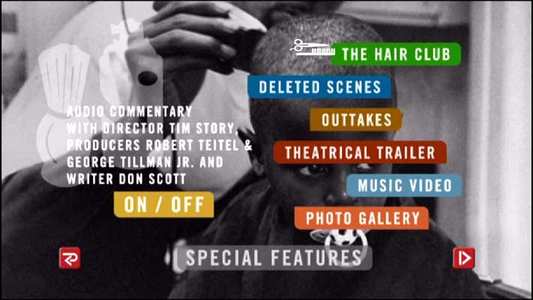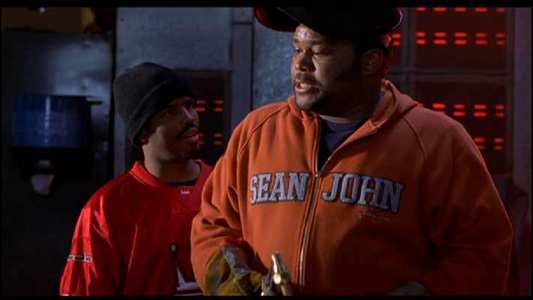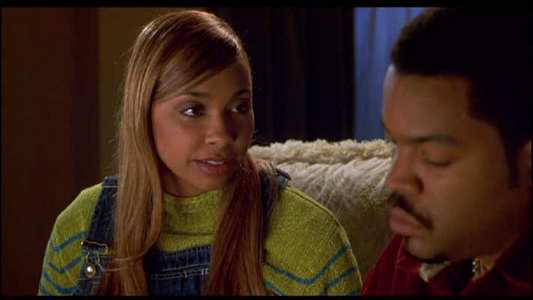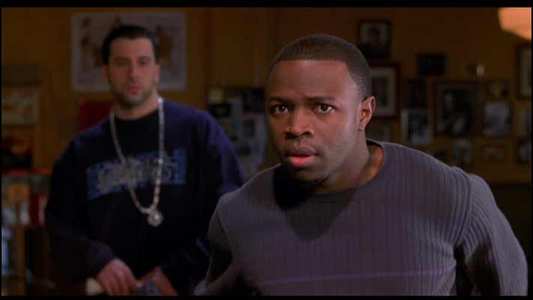Review of Barbershop
Introduction
The producers of ‘Soul Food’ and ‘Men of Honour’ provide another slice of soft-focus mainstream black cinema with ‘Barbershop’, a breezy comedy focusing on a day-in-the-life of the trials and tribulations of the titular Chicago establishment. Run by budding musician Calvin Palmer as a reluctant back-bone of the community, the barbershop is undergoing financial difficulties, not aided by the interference of shady mobster Lester Wallace (Keith David), who places a price on the barbershop’s survival, a price that must be paid before the day’s end. Meanwhile, the likes of pop-star Eve and ‘Save the Last Dance’s Sean Patrick Thomas bicker, complain and talk politics with the barbershop’s straight-talking symbolic paterfamilias Eddie (Cedric the Entertainer).

Video
First-time feature director Tim Story constructs the film out of slick, unobtrusive elements to further emphasise the loose, rather antiquated feel. The transfer lacks the vibrancy of many recent releases, but this may be due to Tom Priestly’s bland autumnal palette. Still, whilst clear of the most obvious flaws, it hardly blows the mind.

Audio
Serviceable 5.1, with the rear channels used sparsely for background atmosphere and the occasional raucous hip-hop track.

Features
There are four featurettes that focus on various aspects of the production: casting, production design, etc. ‘Hair Do’s and Don’ts’ focuses on matters hirsute, spinning off on intriguing speculative insights, such as suggesting that male hair-styles report on the cyclical nature of black culture, specifically the importance of maintaining a singular heritage in the face of the overwhelming influence of the dominant hegemony… Some fumbling outtakes lower the tone somewhat, as do the jokey trailer and music video, featuring the film’s stars and that all-powerful oligarch of the hip-hop world, P. Diddy. An uninteresting collection of deleted scenes and a bland photo gallery accompanies a staid, self-congratulatory love-fest masquerading as a commentary track. The producers, co-writer and director make consistent reference to the upcoming sequel, let’s just hope they manufacture something to say by the time they record the yak-track for it.

Conclusion
A genial, old-fashioned comedy/drama, with a warm and charismatic central performance from Ice Cube that is let down by a script that rarely engenders anything but a passive indifference. Essentially, ‘Barbershop’ is yet another attempt to reconfigure mainstream black images in the wake of the negative representations of the early ‘90s by films such as ‘Menace II Society’. As a result, the black community presented here is filled with good-hearted, strong-willed individuals, working hard to achieve their ambitions whilst maintaining a strong anchor to the past. Whilst the ‘Hood’ films forefronted pervasive violence and gang culture, ‘Barbershop’ is yet another black film to treat such criminal elements as foolish aberrations, objects of ridicule rather than a corrosive social influence. Whilst ‘Barbershop’ is no more guilty of white-washing than any other such film, it is interesting to see Ice Cube, so persuasive as a nihilistic hoodlum in ‘Boyz n the Hood’, playing a cosy father, dedicated to his sweet young family. Whether or not this is a sign of the broadening of black images in American cinema, or a further endorsement of a complacent PC mirage, is never entirely clear.
Whichever proves to be true, ‘Barbershop’ certainly does nothing to further either impulse, being an unapologetically mild strain of comedic lesson-learning. Familiar themes from contemporary black cinema persist, such as the erosion of community values, the significance of physical appearance to black masculinity, post-modern perspectives on the civil rights movement, the white hip-hop phenomenon. All of which are handled with a quaint, rose-tinted liberalism, strident in its message-making but insubstantial in its actual message. However, there is an unerring reliance on conservative attitudes: Thomas’s character’s ambitions to break into the black intelligentsia are conclusively ridiculed, singer Eve is loaded with a cliched tough/sensitive polar-binary `black sista` role. And, somewhat more esoterically, the bumbling old codger (played with verve by 39-year-old Cedric the Entertainer) who rejuvenates the value system of this disenfranchised generation through dubious homilies about the spiritual significance of a hair-cut.
Whilst the film’s harmless flirtations with political incorrectness sometimes sit awkwardly with its unwavering endorsement of multiculturalism and communal solidarity, there’s enough abrasiveness amongst the barbershop’s employees to generate at least a germ of dramatic engagement. An onerous Laurel & Hardy subplot about a stolen ATM machine scrambles in futility for broad laughs, presumably in an attempt to offset the somewhat maudlin tone of the barbershop, but a harmonious tone between the two never develops. ‘Barbershop’ remains threadbare in both humour and drama, resorting to tried and tested subplots: the harmless innocent and his unrequited love for his brazen, sassy colleague, for example, to pass the running time. There are occasional glimpses of what could have been elevated to solid entertainment, but what this amounts to, despite three credited writers, is a script that could have used a good trim.
Your Opinions and Comments
Be the first to post a comment!